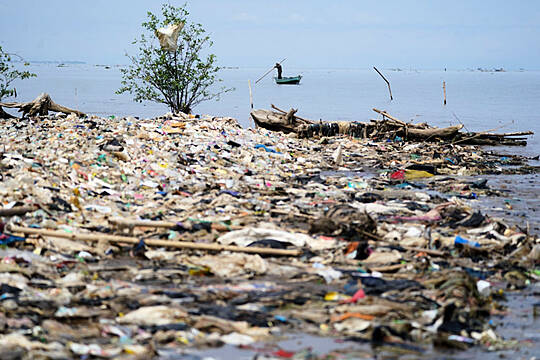Plastic pollution could be reduced by 80 per cent by 2040 if countries and companies make deep policy and market shifts, the UN Environment Programme (UNEP) has said.
To do this, there needs to be more reusing, recycling and more reorienting and diversifying of plastic products, the authors said.
This would include governments promoting refillable bottles, bulk dispensers, deposit-return-schemes and packaging take-back schemes – which could reduce 30 per cent of plastic waste.
An additional 20 per cent could be reduced if recycling became a more stable and profitable industry, while removing fossil fuel subsidies and forcing packaging designers to enhance products’ recyclability would mean the amount of recyclable plastics would increase from 21 per cent to 50 per cent.
Using alternatives such as paper or compostable materials instead of plastic for wrappers, sachets and takeaway items could also save a further 17 per cent in plastic pollution, UNEP said.
All this would still leave 100 million tonnes of single-use and short-lived plastic waste which UNEP said could be dealt with by setting and implementing design and safety standards for its disposal, such as making manufacturers responsible for products shedding microplastics.
UNEP’s executive director Inger Andersen said: “The way we produce, use and dispose of plastics is polluting ecosystems, creating risks for human health and destabilising the climate.
“This UNEP report lays out a roadmap to dramatically reduce these risks through adopting a circular approach that keeps plastics out of ecosystems, out of our bodies and in the economy.
“If we follow this roadmap, including in negotiations on the plastic pollution deal, we can deliver major economic, social and environmental wins.”
The report, titled Turning off the Tap: How the world can end plastic pollution and create a circular economy, comes before a second round of negotiations in Paris on a global treaty to tackle plastic pollution.
Plastic pollution is choking our rivers and oceans.
To #StopPlasticPollution, the #PlasticsTreaty must include global bans on the most harmful plastic products.
So how can we make that happen? https://t.co/oDOOKVCnYP pic.twitter.com/76mkY2nVh3— WWF (@WWF) May 15, 2023
The authors of the report said shifting to a more circular economy would result in savings of $1.27 trillion while a further $3.25 trillion would be saved from improved health, climate, air pollution, marine ecosystems and litigation-related costs.
It would also create a net increase of 700,000 jobs by 2040, mostly in low-income countries.
UNEP said the investment costs are “significant but below the spending without this systemic change” – $65 billion as opposed to $113 billion without the change.
Much of this could be raised by using investments that would have been earmarked for more plastic production, or by introducing a levy on virgin plastic products.
Failing to introduce these policies in time and delaying by five years could lead to an increase of 80 million tonnes of plastic pollution by 2040, UNEP said.
Plastic has been found in almost every corner of the world, including Antarctica, while earlier this year scientists recorded for the first time a disease caused by plastic in birds – named plasticosis – which inflames the digestive tract.







